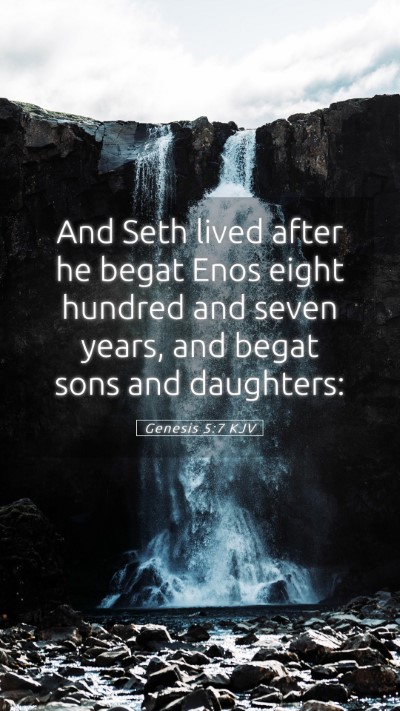Bible Verse Commentary: Genesis 5:7
Genesis 5:7 states: "And he begat sons and daughters: and all the days of Seth were nine hundred and twelve years: and he died." This verse is part of the genealogical account detailing the lineage from Adam to Noah. It highlights not only the age of Seth but also the continuity of life through his progeny.
Understanding the Context
The genealogy in Genesis provides critical insights into the early human family and God's unfolding plan for humanity. Each name and age mentioned in the genealogy serves as a link between generations, emphasizing God's promise of life and continuity.
Insights from Public Domain Commentaries
-
Matthew Henry:
Henry emphasizes the importance of understanding the genealogies as a demonstration of God's grace in preserving a remnant. He notes that the long lives during this period signify God’s patience, allowing time for repentance and righteousness among mankind.
-
Albert Barnes:
Barnes interprets this verse to reflect the significance of Seth as a chosen lineage that continued the worship of Yahweh after the murder of Abel. He points out that the mention of sons and daughters indicates the multiplication of humanity and God’s command to be fruitful and multiply.
-
Adam Clarke:
Clarke adds a sociological aspect to the interpretation, suggesting a focus on family and legacy. The mention of Seth's sons and daughters underscores the importance of descendants in ancient cultures, which is a point of reflection for readers regarding family values and traditions.
Key Themes and Applications
This verse encapsulates several themes that can be extracted for personal application:
- The Value of Life: The ages of these early figures are indicative of the value placed on life and longevity in the biblical narrative. Readers are reminded to cherish their own lives and the lives of those they love.
- Legacy and Heritage: The narrative encourages reflection on what kind of legacy one leaves for future generations. As Seth had sons and daughters, what will we pass on spiritually and culturally?
- Divine Providence: The survival of Seth’s lineage represents God’s providence in guiding human history. Understanding how God works through generations enhances our appreciation of His plans for humanity.
Cross References
This verse connects with several other passages that further elucidate its significance:
- Genesis 4:25: Discusses the birth of Seth, emphasizing his role as a replacement for Abel and the beginning of a righteous line.
- Genesis 6:1-2: Highlights the growing population and the interplay of the godly and the ungodly, reflecting the outcomes of Seth’s lineage.
- Hebrews 11:4: Mentions Abel’s faith, which influences the understanding of the godliness that followed through Seth.
Conclusion
Genesis 5:7 serves as a crucial link in the narrative of the Old Testament, illustrating the importance of lineage, life, and the faithfulness of God through generations. By engaging with the insights provided by historical commentaries, readers can deepen their understanding of Scripture and its application to their lives.
Study and Reflection
For those participating in Bible study groups or pursuing online Bible study, this verse invites discussion on how ancestral lines impact faith and community. Questions to consider include:
- How does understanding our spiritual lineage impact our view of faith today?
- What lessons can we draw from Seth’s life and the significance of family in our spiritual journeys?
Engaging with this passage provides Bible study insights that are vital for personal growth and collective understanding of God’s plan as revealed in Scripture.


